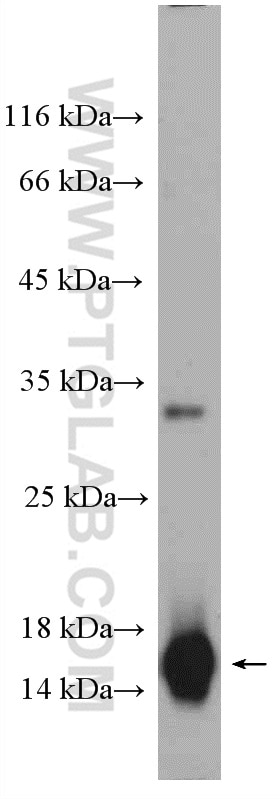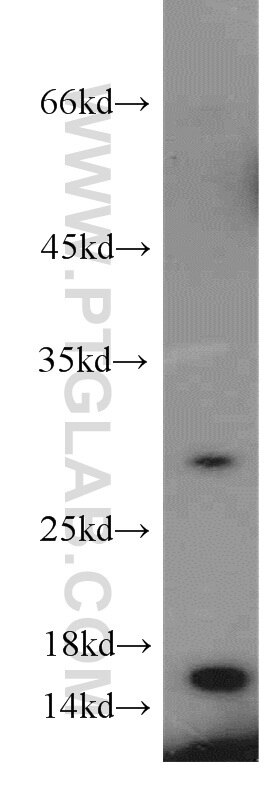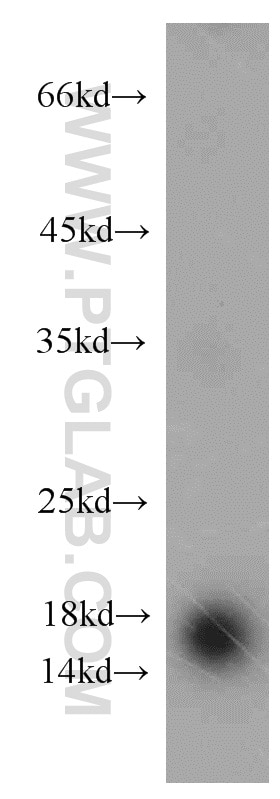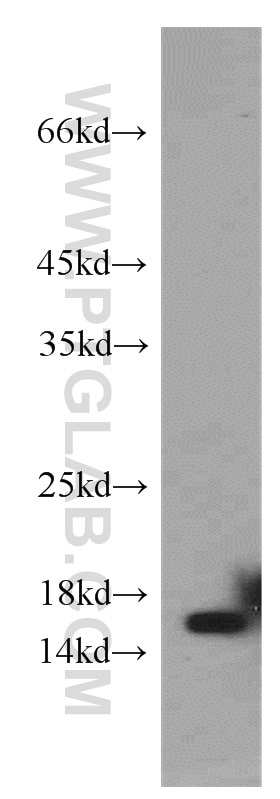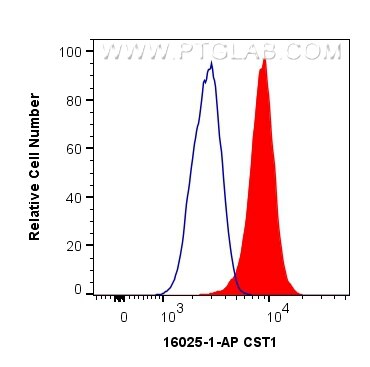- Phare
- Validé par KD/KO
Anticorps Polyclonal de lapin anti-CST1
CST1 Polyclonal Antibody for WB, ELISA, FC (Intra)
Hôte / Isotype
Lapin / IgG
Réactivité testée
Humain
Applications
WB, IP, IF, IHC, CoIP, ELISA, FC (Intra)
Conjugaison
Non conjugué
N° de cat : 16025-1-AP
Synonymes
Galerie de données de validation
Applications testées
| Résultats positifs en WB | tissu salivaire humain, cellules COLO 320, tissu de glande surrénale humain, tissu testiculaire humain |
| Résultats positifs en FC (Intra) | cellules MCF-7 |
| Résultats positifs en cytométrie | cellules MCF-7 |
Dilution recommandée
| Application | Dilution |
|---|---|
| Western Blot (WB) | WB : 1:500-1:2000 |
| Flow Cytometry (FC) (INTRA) | FC (INTRA) : 0.40 ug per 10^6 cells in a 100 µl suspension |
| Flow Cytometry (FC) | FC : 0.40 ug per 10^6 cells in a 100 µl suspension |
| It is recommended that this reagent should be titrated in each testing system to obtain optimal results. | |
| Sample-dependent, check data in validation data gallery | |
Applications publiées
| KD/KO | See 2 publications below |
| WB | See 9 publications below |
| IHC | See 9 publications below |
| IF | See 2 publications below |
| IP | See 1 publications below |
| ELISA | See 1 publications below |
| CoIP | See 1 publications below |
Informations sur le produit
16025-1-AP cible CST1 dans les applications de WB, IP, IF, IHC, CoIP, ELISA, FC (Intra) et montre une réactivité avec des échantillons Humain
| Réactivité | Humain |
| Réactivité citée | Humain |
| Hôte / Isotype | Lapin / IgG |
| Clonalité | Polyclonal |
| Type | Anticorps |
| Immunogène | CST1 Protéine recombinante Ag8862 |
| Nom complet | cystatin SN |
| Masse moléculaire calculée | 141 aa, 16 kDa |
| Poids moléculaire observé | 14-16 kDa |
| Numéro d’acquisition GenBank | BC021225 |
| Symbole du gène | CST1 |
| Identification du gène (NCBI) | 1469 |
| Conjugaison | Non conjugué |
| Forme | Liquide |
| Méthode de purification | Purification par affinité contre l'antigène |
| Tampon de stockage | PBS avec azoture de sodium à 0,02 % et glycérol à 50 % pH 7,3 |
| Conditions de stockage | Stocker à -20°C. Stable pendant un an après l'expédition. L'aliquotage n'est pas nécessaire pour le stockage à -20oC Les 20ul contiennent 0,1% de BSA. |
Protocole
| Product Specific Protocols | |
|---|---|
| WB protocol for CST1 antibody 16025-1-AP | Download protocol |
| Standard Protocols | |
|---|---|
| Click here to view our Standard Protocols |
Publications
| Species | Application | Title |
|---|---|---|
Cell Rep Med Personalized drug screening in patient-derived organoids of biliary tract cancer and its clinical application | ||
Nat Commun Integrated single-cell transcriptome analysis reveals heterogeneity of esophageal squamous cell carcinoma microenvironment. | ||
Cell Res Differential secretome analysis reveals CST6 as a suppressor of breast cancer bone metastasis. | ||
Oncogene CST1 inhibits ferroptosis and promotes gastric cancer metastasis by regulating GPX4 protein stability via OTUB1
| ||
Mol Oncol Cancer-associated fibroblasts educate normal fibroblasts to facilitate cancer cell spreading and T cell suppression. | ||
Aging (Albany NY) Transcriptional dysregulation of TRIM29 promotes colorectal cancer carcinogenesis via pyruvate kinase-mediated glucose metabolism. |
